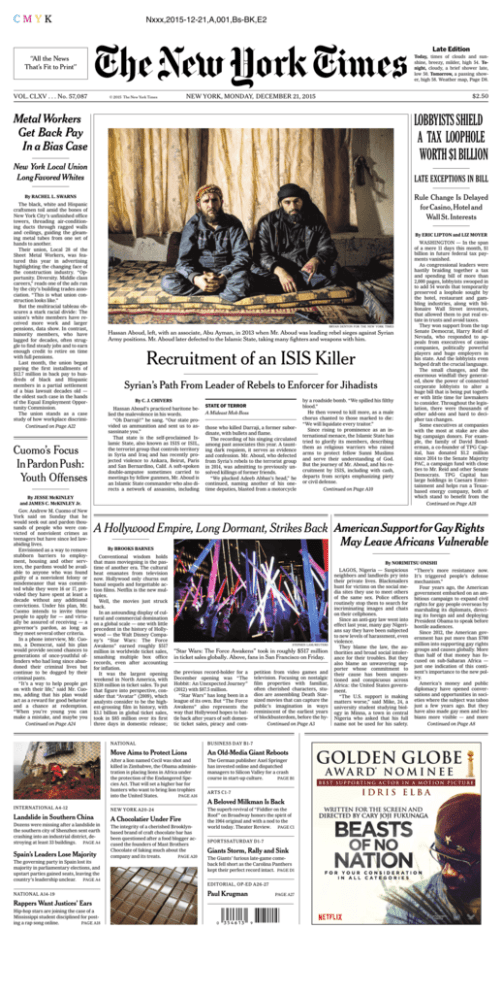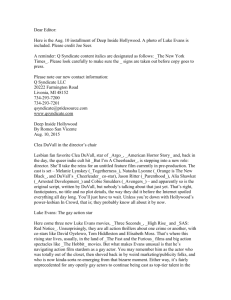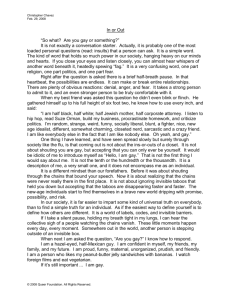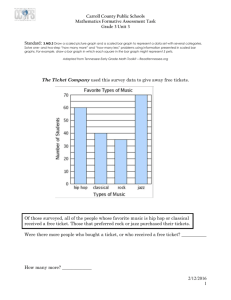Recruitment of an ISIS Killer
advertisement

CMYK Nxxx,2015-12-21,A,001,Bs-BK,E2 Late Edition Today, times of clouds and sunshine, breezy, milder, high 54. Tonight, cloudy, a brief shower late, low 50. Tomorrow, a passing shower, high 58. Weather map, Page D8. VOL. CLXV . . . No. 57,087 $2.50 NEW YORK, MONDAY, DECEMBER 21, 2015 © 2015 The New York Times LOBBYISTS SHIELD A TAX LOOPHOLE WORTH $1 BILLION Metal Workers Get Back Pay In a Bias Case New York Local Union Long Favored Whites LATE EXCEPTIONS IN BILL Rule Change Is Delayed for Casino, Hotel and Wall St. Interests By RACHEL L. SWARNS The black, white and Hispanic craftsmen toil amid the bones of New York City’s unfinished office towers, threading air-conditioning ducts through ragged walls and ceilings, guiding the gleaming metal tubes from one set of hands to another. Their union, Local 28 of the Sheet Metal Workers, was featured this year in advertising highlighting the changing face of the construction industry. “Opportunity. Diversity. Middle class careers,” reads one of the ads run by the city’s building trades association. “This is what union construction looks like.” But the multiracial tableau obscures a stark racial divide: The union’s white members have received more work and larger pensions, data show. In contrast, minority members, who have lagged for decades, often struggle to find steady jobs and to earn enough credit to retire on time with full pensions. Last month, the union began paying the first installments of $12.7 million in back pay to hundreds of black and Hispanic members in a partial settlement of a bias lawsuit decades old — the oldest such case in the hands of the Equal Employment Opportunity Commission. The union stands as a case study of how workplace discrimiContinued on Page A22 By ERIC LIPTON and LIZ MOYER BRYAN DENTON FOR THE NEW YORK TIMES Hassan Aboud, left, with an associate, Abu Ayman, in 2013 when Mr. Aboud was leading rebel sieges against Syrian Army positions. Mr. Aboud later defected to the Islamic State, taking many fighters and weapons with him. Recruitment of an ISIS Killer Syrian’s Path From Leader of Rebels to Enforcer for Jihadists By C. J. CHIVERS Hassan Aboud’s practiced baritone belied the malevolence in his words. “Oh Darraji!” he sang. “Our state provided us ammunition and sent us to assassinate you.” That state is the self-proclaimed Islamic State, also known as ISIS or ISIL, the terrorist group that controls territory in Syria and Iraq and has recently projected violence to Ankara, Beirut, Paris and San Bernardino, Calif. A soft-spoken double-amputee sometimes carried to meetings by fellow gunmen, Mr. Aboud is an Islamic State commander who also directs a network of assassins, including Cuomo’s Focus In Pardon Push: Youth Offenses STATE OF TERROR A Mideast Mob Boss those who killed Darraji, a former subordinate, with bullets and flame. The recording of his singing circulated among past associates this year. A taunting dark requiem, it serves as evidence and confession. Mr. Aboud, who defected from Syria’s rebels to the terrorist group in 2014, was admitting to previously unsolved killings of former friends. “We plucked Adeeb Abbas’s head,” he continued, naming another of his onetime deputies, blasted from a motorcycle by a roadside bomb. “We spilled his filthy blood.” He then vowed to kill more, as a male chorus chanted to those marked to die: “We will liquidate every traitor.” Since rising to prominence as an international menace, the Islamic State has tried to glorify its members, describing them as religious warriors who raised arms to protect fellow Sunni Muslims and serve their understanding of God. But the journey of Mr. Aboud, and his recruitment by ISIS, including with cash, departs from scripts emphasizing piety or civil defense. Continued on Page A10 By JESSE McKINLEY and JAMES C. McKINLEY Jr. Gov. Andrew M. Cuomo of New York said on Sunday that he would seek out and pardon thousands of people who were convicted of nonviolent crimes as teenagers but have since led lawabiding lives. Envisioned as a way to remove stubborn barriers to employment, housing and other services, the pardons would be available to anyone who was found guilty of a nonviolent felony or misdemeanor that was committed while they were 16 or 17, provided they have spent at least a decade without any additional convictions. Under his plan, Mr. Cuomo intends to invite those people to apply for — and virtually be assured of receiving — a governor’s pardon, as long as they meet several other criteria. In a phone interview, Mr. Cuomo, a Democrat, said his plan would provide second chances to generations of once-youthful offenders who had long since abandoned their criminal lives but continue to be dogged by their criminal pasts. “It’s a way to help people get on with their life,” said Mr. Cuomo, adding that his plan would act as a reward for good behavior and a chance at redemption. “When you’re young you can make a mistake, and maybe you Continued on Page A24 WASHINGTON — In the span of a mere 11 days this month, $1 billion in future federal tax payments vanished. As congressional leaders were hastily braiding together a tax and spending bill of more than 2,000 pages, lobbyists swooped in to add 54 words that temporarily preserved a loophole sought by the hotel, restaurant and gambling industries, along with billionaire Wall Street investors, that allowed them to put real estate in trusts and avoid taxes. They won support from the top Senate Democrat, Harry Reid of Nevada, who responded to appeals from executives of casino companies, politically powerful players and huge employers in his state. And the lobbyists even helped draft the crucial language. The small changes, and the enormous windfall they generated, show the power of connected corporate lobbyists to alter a huge bill that is being put together with little time for lawmakers to consider. Throughout the legislation, there were thousands of other add-ons and hard to decipher tax changes. Some executives at companies with the most at stake are also big campaign donors. For example, the family of David Bonderman, a co-founder of TPG Capital, has donated $1.2 million since 2014 to the Senate Majority PAC, a campaign fund with close ties to Mr. Reid and other Senate Democrats. TPG Capital has large holdings in Caesars Entertainment and helps run a Texasbased energy company, both of which stand to benefit from the Continued on Page A18 A Hollywood Empire, Long Dormant, Strikes Back American Support for Gay Rights May Leave Africans Vulnerable By BROOKS BARNES Conventional wisdom holds that mass moviegoing is the pastime of another era. The cultural heat emanates from television now. Hollywood only churns out banal sequels and forgettable action films. Netflix is the new multiplex. Well, the movies just struck back. In an astounding display of cultural and commercial domination on a global scale — one with little precedent in the history of Hollywood — the Walt Disney Company’s “Star Wars: The Force Awakens” earned roughly $517 million in worldwide ticket sales, smashing multiple box office records, even after accounting for inflation. It was the largest opening weekend in North America, with $238 million in ticket sales. To put that figure into perspective, consider that “Avatar” (2009), which analysts consider to be the highest-grossing film in history, with $3.1 billion in global ticket sales, took in $85 million over its first three days in domestic release; By NORIMITSU ONISHI STEPHEN LAM/REUTERS “Star Wars: The Force Awakens” took in roughly $517 million in ticket sales globally. Above, fans in San Francisco on Friday. the previous record-holder for a December opening was “The Hobbit: An Unexpected Journey” (2012) with $87.5 million. “Star Wars” has long been in a league of its own. But “The Force Awakens” also represents the way that Hollywood hopes to battle back after years of soft domestic ticket sales, piracy and com- petition from video games and television. Focusing on nostalgic film properties with familiar, often cherished characters, studios are assembling Death Starsized movies that can capture the public’s imagination in ways reminiscent of the earliest years of blockbusterdom, before the hyContinued on Page A3 NATIONAL BUSINESS DAY B1-7 Move Aims to Protect Lions An Old-Media Giant Reboots After a lion named Cecil was shot and killed in Zimbabwe, the Obama administration is placing lions in Africa under the protection of the Endangered Species Act. That will set a higher bar for hunters who want to bring lion trophies PAGE A16 into the United States. The German publisher Axel Springer has invested online and dispatched managers to Silicon Valley for a crash PAGE B1 course in start-up culture. ARTS C1-7 A Beloved Milkman Is Back INTERNATIONAL A4-12 NEW YORK A20-24 Landslide in Southern China A Chocolatier Under Fire Dozens were missing after a landslide in the southern city of Shenzhen sent earth crashing into an industrial district, destroying at least 33 buildings. PAGE A4 The integrity of a cherished Brooklynbased brand of craft chocolate bar has been questioned after a food blogger accused the founders of Mast Brothers Chocolate of faking much about the PAGE A20 company and its treats. Spain’s Leaders Lose Majority The governing party in Spain lost its majority in parliamentary elections, and upstart parties gained seats, leaving the country’s leadership unclear. PAGE A4 The superb revival of “Fiddler on the Roof” on Broadway honors the spirit of the 1964 original and with a nod to the world today. Theater Review. PAGE C1 SPORTSSATURDAY D1-7 Giants Storm, Rally and Sink The Giants’ furious late-game comeback fell short as the Carolina Panthers kept their perfect record intact. PAGE D1 EDITORIAL, OP-ED A26-27 NATIONAL A14-19 Rappers Want Justices’ Ears Hip-hop stars are joining the case of a Mississippi student disciplined for posting a rap song online. PAGE A18 Paul Krugman PAGE A27 U(D54G1D)y+\!?!#!#!, LAGOS, Nigeria — Suspicious neighbors and landlords pry into their private lives. Blackmailers hunt for victims on the social media sites they use to meet others of the same sex. Police officers routinely stop them to search for incriminating images and chats on their cellphones. Since an anti-gay law went into effect last year, many gay Nigerians say they have been subjected to new levels of harassment, even violence. They blame the law, the authorities and broad social intolerance for their troubles. But they also blame an unwavering supporter whose commitment to their cause has been unquestioned and conspicuous across Africa: the United States government. “The U.S. support is making matters worse,” said Mike, 24, a university student studying biology in Minna, a town in central Nigeria who asked that his full name not be used for his safety. “There’s more resistance now. It’s triggered people’s defense mechanism.” Four years ago, the American government embarked on an ambitious campaign to expand civil rights for gay people overseas by marshaling its diplomats, directing its foreign aid and deploying President Obama to speak before hostile audiences. Since 2012, the American government has put more than $700 million into supporting gay rights groups and causes globally. More than half of that money has focused on sub-Saharan Africa — just one indication of this continent’s importance to the new policy. America’s money and public diplomacy have opened conversations and opportunities in societies where the subject was taboo just a few years ago. But they have also made gay men and lesbians more visible — and more Continued on Page A8






